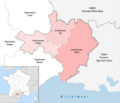Arrondissements of the Gard department facts for kids
The Gard department in France has 3 main areas called arrondissements. Think of an arrondissement like a big district or a borough within a larger region. It's a way to organize a department into smaller parts.
Each arrondissement has a main town, which is like its capital. This main town is called a subprefecture. If the main town of the whole department (called a prefecture) is also in an arrondissement, then that town acts as both the department's capital and the arrondissement's capital.
These arrondissements are then split into even smaller areas called communes, which are like towns or villages.
Here are the arrondissements in the Gard department:
| INSEE code |
Arrondissement | Capital | Population (2014) |
Area (km²) |
Density (Inh./km²) |
Communes |
|---|---|---|---|---|---|---|
| 301 | Alès | Alès | 151,823 | 1,321.6 | 114.9 | 101 |
| 302 | Nîmes | Nîmes | 547,598 | 3,132.8 | 174.8 | 177 |
| 303 | Le Vigan | Le Vigan | 36,608 | 1,398.5 | 26.2 | 75 |
History of Gard's Arrondissements
The Gard department was created a long time ago, on March 4, 1790, during the French Revolution. At first, it was divided into 8 smaller areas called districts. These districts included Alais, Beaucaire, Nîmes, and Le Vigan.
Nîmes was usually the main capital, but sometimes Alais and Uzès also took turns. By 1794, Nîmes became the only capital for the department.
Later, when the idea of arrondissements was introduced, these 8 districts were reorganized into four arrondissements: Nîmes, Alais, Uzès, and Le Vigan. However, in 1926, the arrondissement of Uzès was removed, leaving the three arrondissements we see today.
See Also
Images for kids
 | Shirley Ann Jackson |
 | Garett Morgan |
 | J. Ernest Wilkins Jr. |
 | Elijah McCoy |


